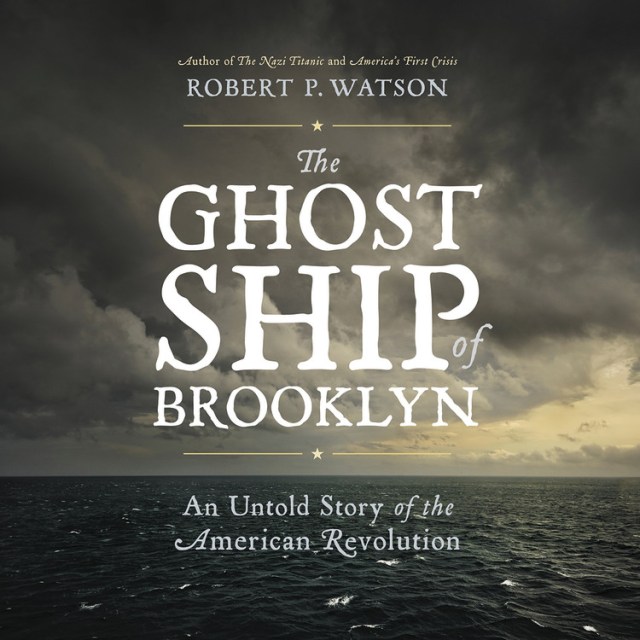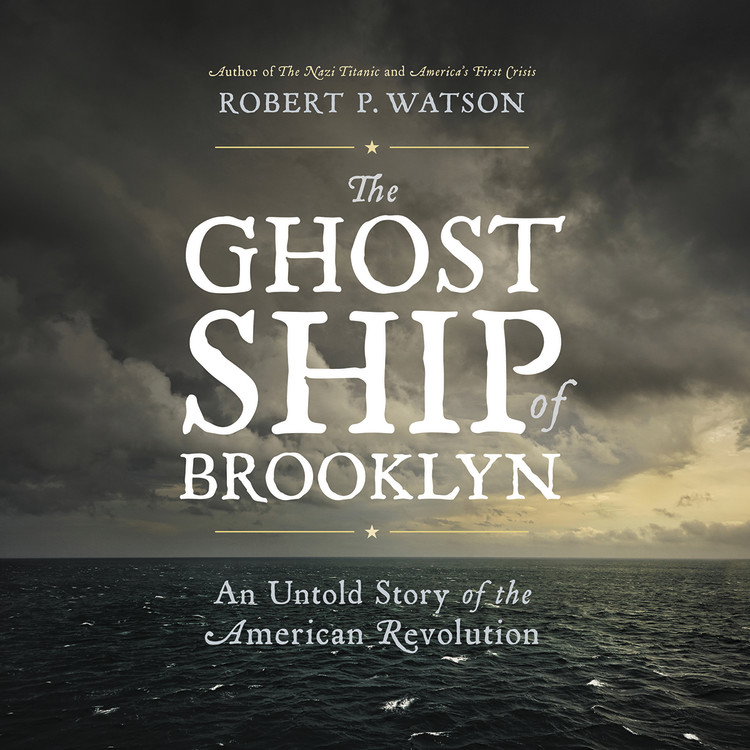By clicking “Accept,” you agree to the use of cookies and similar technologies on your device as set forth in our Cookie Policy and our Privacy Policy. Please note that certain cookies are essential for this website to function properly and do not require user consent to be deployed.
The Ghost Ship of Brooklyn
An Untold Story of the American Revolution
Contributors
Read by Bob Hess
Formats and Prices
- On Sale
- Aug 15, 2017
- Publisher
- Hachette Audio
- ISBN-13
- 9781478947189
Format
Format:
- Audiobook Download (Unabridged)
- Hardcover $37.00 $47.00 CAD
This item is a preorder. Your payment method will be charged immediately, and the product is expected to ship on or around August 15, 2017. This date is subject to change due to shipping delays beyond our control.
Buy from Other Retailers:
Moored off the coast of Brooklyn until the end of the war, the derelict ship, the HMS Jersey, was a living hell for thousands of Americans either captured by the British or accused of disloyalty. Crammed below deck — a shocking one thousand at a time — without light or fresh air, the prisoners were scarcely fed food and water. Disease ran rampant and human waste fouled the air as prisoners suffered mightily at the hands of brutal British and Hessian guards. Throughout the colonies, the mere mention of the ship sparked fear and loathing of British troops. It also sparked a backlash of outrage as newspapers everywhere described the horrors onboard the ghostly ship. This shocking event, much like the better-known Boston Massacre before it, ended up rallying public support for the war.
Revealing for the first time hundreds of accounts culled from old newspapers, diaries, and military reports, award-winning historian Robert P. Watson follows the lives and ordeals of the ship’s few survivors to tell the astonishing story of the cursed ship that killed thousands of Americans and yet helped secure victory in the fight for independence.
-
"The Ghost Ship of Brooklyn brings to life the hell on water that thousands of prisoners were forced to endure during the American Revolutionary War. Through these untold stories, Robert Watson recounts the horrors inflicted aboard the HMS Jersey, remembers the courageous spirit of its captives, and ensures the memory of these American Patriots will never be forgotten."--Senator John McCain (R-AZ), former Navy pilot and Vietnam POW
-
"In vivid and often elegiac prose, Robert Watson has rediscovered a forgotten story about the grim and usually fatal fate of American prisoners of war during the American Revolution. We carry in our heads prim and proper pictures of that patriotic struggle that will need to be revised on the basis of Watson's thorough documentation of the hellish conditions aboard those floating dungeons, where twice as many American soldiers and sailors died than in all the battles of the war. Watson makes 'lest we forget' ironic, since until now, we have."--Joseph J. Ellis, Pulitzer Prize- and National Book Award-winning author of Founding Brothers and American Sphinx
-
"A fascinating collection of stories of American Revolutionary War soldiers and sailors captured by the British and imprisoned, many of them in the infamous ship, Jersey, the hell that floated off of Brooklyn. These stories may have been once forgotten by history, but with the publication of this very readable book, that will be no longer possible."--Gordon Wood, Pulitzer Prize- and Bancroft Prize-winning author of The Radicalism of the American Revolution and Empire of Liberty
-
"A tale worth retelling."New York Times
-
"A penetrating look at forgotten horrors of America's Revolutionary War...Watson makes reading history a totally engaging experience. He does so by choosing unusual and challenging topics, setting them into contexts rich in detail, and presenting them in a prose style that is clear, vivid, and uncluttered by academic jargon. His latest book is a piece of fine storytelling, accessible to the general reader. Prof. Watson makes historical events shine as if they were today's news...This sobering book reminds us that no one can overestimate the human capacity for cruelty or underestimate the capacity for perseverance and courage."Florida Weekly
-
"A readable...account of the worst atrocity committed by either side during the Revolutionary War, as well as a damning portrayal of the British military's 'moral state.'"Wall Street Journal
-
"The memory of the prison-ship captives is honorably served in Robert P. Watson's terrifying new history."New York Post
-
"Watson has recounted this story to remind contemporary America of those who came before and kept their eyes on the prize in spite of the horrors and deprivations of wartime capture."New York Journal of Books
-
"The Ghost Ship of Brooklyn sheds light on this little-known, yet dark chapter in American history...The narrative flair [Watson] showed in his previous works, such as The Nazi Titanic and America's First Crisis, continues with Ghost Ship. The text is accessible to the casual reader, yet contains enough notes and appendixes to be a resource for the serious scholar...Watson makes a case that the Jersey was the bloodiest 'battle' of the war."The Gotham Center for New York City History
-
"Well researched and written, using actual transcripts from the few survivors...Well worth a read-even if you're not interested in military history as such."Nudge Book
-
"Watson has succeeded in shedding a brilliant light on a little-known facet of the American Revolution: the British prison ships of Brooklyn...Watson writes with great verve as he offers account after harrowing account of prisoners coming to grips with their fate. He uses extensive resources, and the narrative reads like a gothic horror tale...[An] empathetic rendering of a mostly forgotten chapter of American history. Anyone interested in this time period will find this book an illuminating and worthwhile read."Washington Independent Review of Books
-
"It's clear author Robert P. Watson has done a great deal of research to present this largely-unknown story in such detail. His use of first-hand accounts written by some of the few who survived the ordeal lends an incredible, yet fascinating, window into the horror. The writing flows well and Watson uses great storytelling techniques that make the subject matter eminently readable."Manhattan Book Review
-
"A very well-written account of a rather grim and dismal situation which has hitherto been neglected in naval history."Warship International
-
"Sharp and incisive...[The] Ghost Ship of Brooklyn showcases several stories of impossible survival, daring prison breaks and even a couple surprising rescues. For every grim statistic, there's a moment of desperate bravery."The Bowery Boys
-
"The story of how this ship sparked enough outrage to fuel the Revolution makes for a powerful account which documents individuals who suffered on the ship, escaped from its conditions, and helped keep its memory a part of American history which has not been properly examined until this survey. No American history holding should be without this eye-opening account."Midwest Book Review
-
"A stirring reminder of the sacrifices made by so many, during America's war for independence."Champaign News-Gazette
-
"In breezy but sober prose [Watson] fills in a large gap in the average American's knowledge of the 1775-1783 War for Independence...He offers vivid descriptions of conditions and incidents aboard the Jersey and of prisoner revolts and escapes...But he also jumps ship into the wider world, sketching General George Washington's struggle to facilitate prisoner exchanges, and even giving us occasional glimpses of the humane...The Ghost Ship of Brooklyn is a long-overdue account of this neglected chapter of the American Revolution."Blogcritics
-
"Provides significant food for thought about our own times, and how treatment of prisoners of war can have significant unintended consequences."Naval History
-
"The rotten hulk of the Jersey sank in 1783, becoming a ghost ship on the harbor bottom. The story of the suffering of its inmates is finally being told in this well-researched expose."WTBF Radio
-
"[A] well-written and researched book...It is essential to understanding the fury with which the British lashed out against Americans taken POW during the American Revolution. Recommended."Choice
-
"A history book of an element of the Revolutionary War most likely little known to us as Americans, and certainly not recounted in our elementary or high school education about the War...For anyone interested in the Revolutionary War, this is a well-written, well-structured, informative, and evocative presentation of the horrors from which these men perished and few survived."Portland Book Review
-
"A gripping, horrific account of misery, degradation, torture and inhumanity...A Dantesque portrait of a living hell."American Spirit
-
"The author skillfully reconstructs the horrific, little known story of the Jersey and its prisoners...The Ghost Ship of Brooklyn is a welcome...reminder that many unknown patriots suffered greatly and gave their lives to establish the United States and that we should keep their memory alive."Michigan War Studies Review
-
"The author brings these untold stories to life using clear prose and detailed accounts. The book is a fascinating look at a part of the war which has been largely forgotten today."Military Heritage
Newsletter Signup
By clicking ‘Sign Up,’ I acknowledge that I have read and agree to Hachette Book Group’s Privacy Policy and Terms of Use







